The question of the day is, “Can you freeze eggs?” The answer is yes! I will teach you how to safely freeze raw and cooked eggs in just a few simple steps.
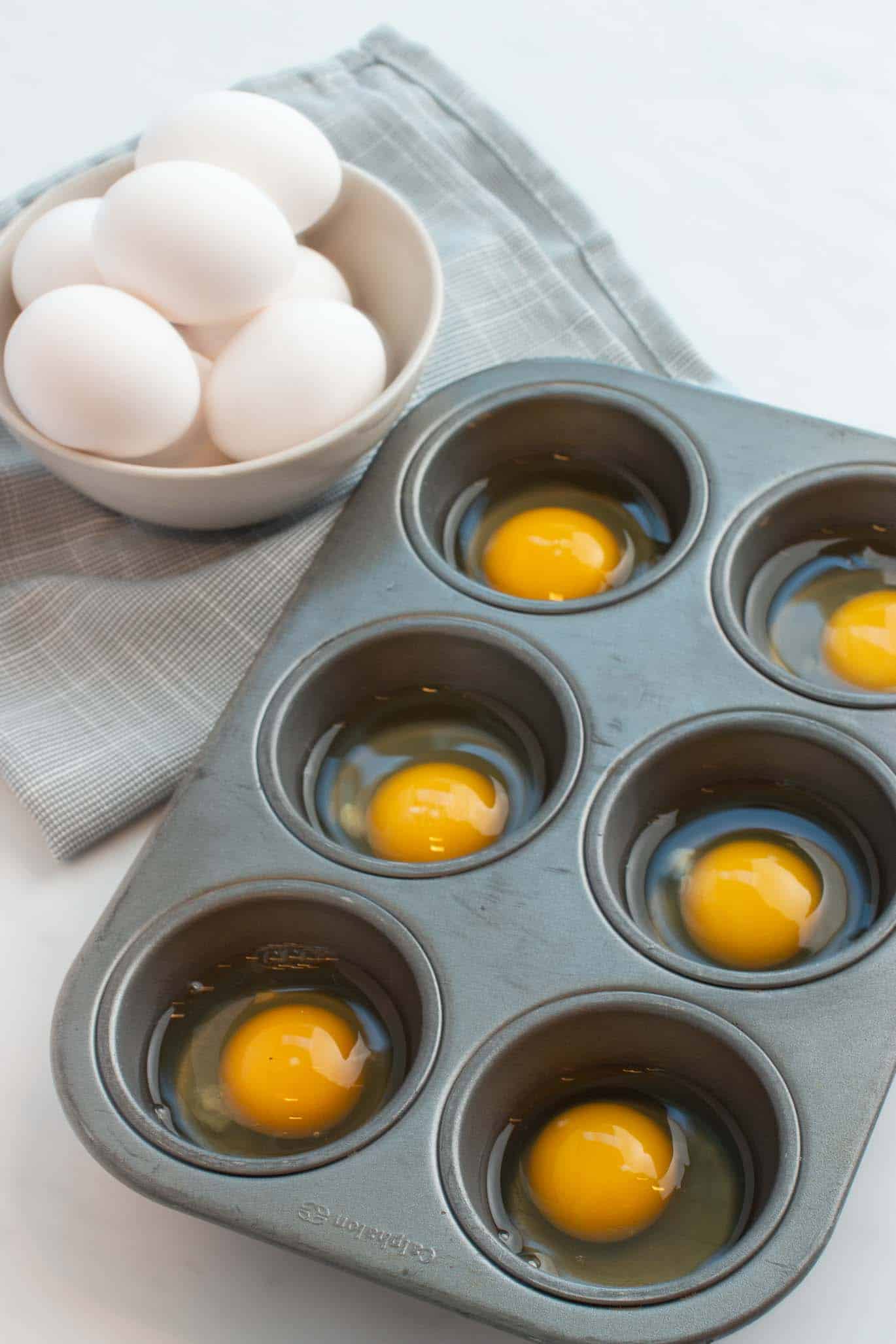
We have four sweet little chickens that we’ve raised. They normally give us about 3-4 eggs every day. Some weeks that many eggs for my family is not enough, but other times (when we haven’t been using them as much), my containers and bowls fill up to the brim and eggs are coming out of our ears!
I love to give the extras away and never seem to have anyone turn them away. However, if I’m trying to save money it’s really easy to simply freeze the eggs and use them myself later too.
Can You Freeze Eggs?
Yes, you can! And they taste darn near the same after they have thawed too. You can fry them, bake with them or add them to casseroles or other recipes even after they have been frozen and thawed.
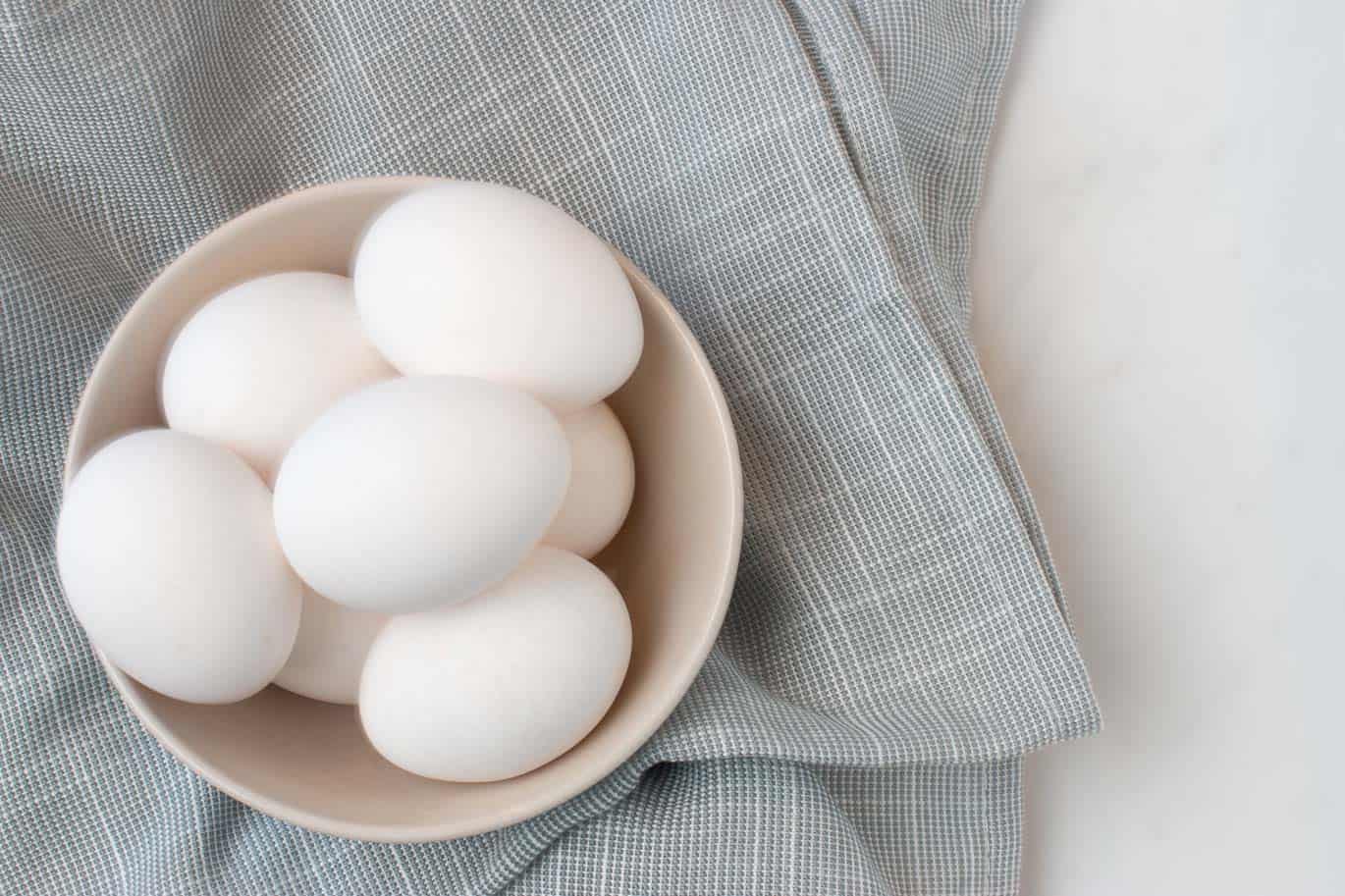
What Are the Benefits of Freezing Eggs?
- Cost. This is a fantastic way to stock up on eggs when they are on sale, or a great idea to use them up when you have a lot about to expire too. When you see those sales on eggs..have no fear. Now you can go crazy. So easy AND practical! Doing this can save you money.
- Supply. Always have eggs on hand when you use frozen eggs. Nothing is worse than going to bake a cake and realizing you’re an egg or two short!
- Time. Save yourself time by having eggs already prepped for cooking or baking ahead of time. Sometimes those little steps, like freezing eggs, can add up to shave valuable time off cooking!
- Space. Raw eggs can take up a lot of room in the fridge. Freezing them will move them from the fridge into the freezer, and will save you a ton of space!
HOW TO FREEZE EGGS
The Best Method
- Lightly scramble the eggs. Stir with a fork until the yolk and whites are blended together without incorporating air.
- Add salt or sugar to your eggs – don’t skip this part!! Egg yolks have a gelatinous property in them that will thicken when frozen. By adding in salt or sugar before freezing, it will stop it from happening.
>>> Add in 1 teaspoon of salt per cup of eggs for eggs that will be used for savory items like scrambled eggs, omelets or souffles.
>>>Add in 1 teaspoon of sugar per cup of eggs for eggs that will be used for cake, desserts or sweet items.
>>> If you are freezing individual eggs, use 1/8 teaspoon of salt or sugar for each egg. - Store your eggs. Cover and freeze in a muffin tin or ice cube tray until frozen (about 4-6 hours), and then transfer them to freezer containers or freezer-safe bags.
- Label your eggs. Add the date, the quantity and make a note on your storage container if you used salt or sugar in the eggs. Make sure you adjust the recipe to compensate for the sugar or salt that you used in your eggs. Your eggs are now good for up to a year.
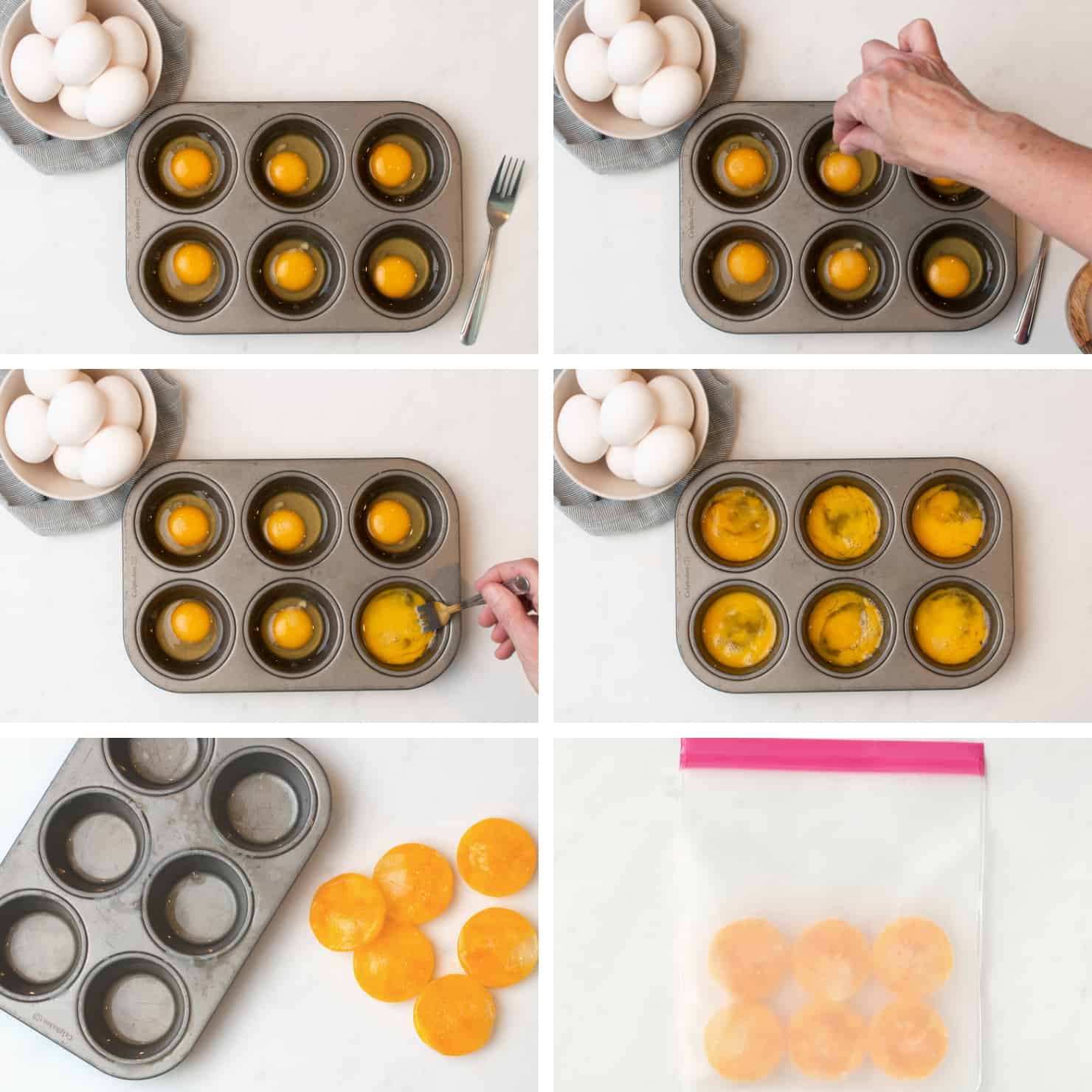
The Old Fashioned Way
For years I used the method of cracking an egg into an ice-cube tray, covering it and allowing it to freeze, and then storing it in a freezer-safe bag to use for up to a year. When thawed the eggs didn’t make the perfect fried egg. The yokes got thicker and the texture changed. After more research and testing, it’s better (and my recommendation) to use the Best Method above.
Freezing Egg Whites
Stir the egg whites together with a fork, and then freeze and package them in quantities you will use for recipes etc. It’s good to note that egg whites seem to whip up better and fluffier than after they’re frozen – so freeze away!
Freezing Egg Yolks
Beat the egg yolks slightly with a fork, add your salt or sugar to them with the same quantities as above, and then freeze and package the same way as you would whole eggs above. It’s also good to note here that egg yolks don’t freeze as favorably as egg whites, but are still usable in sauces etc.
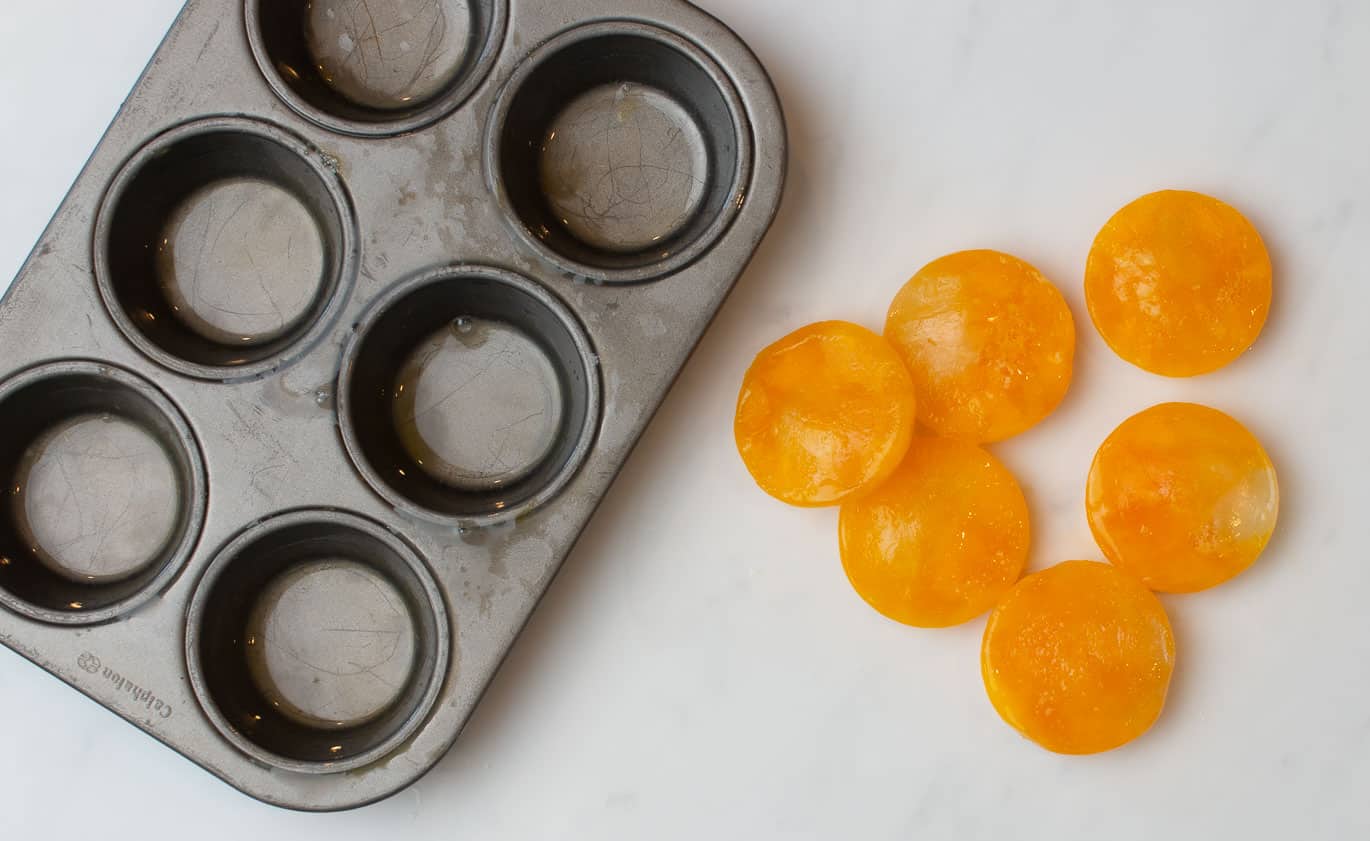
Thawing Eggs
To thaw eggs, always do so in a closed container in the refrigerator for 6-8 hours or overnight and use immediately. To thaw the ice cubes, use a small covered dish. To speed up thawing, place container in a bowl of cold water. Egg whites can be stored, thawed, in the refrigerator for 2-3 days. DO NOT REFREEZE EGGS.
Can You Freeze a Hard Boiled Egg?
If you freeze a whole hard-boiled egg, the egg whites will be chewy and watery when thawed, and not enjoyable! So, no, you don’t want to freeze a hard boiled egg. Egg yolks can be frozen to use later for toppings and garnishes, but you will need a little prep first.
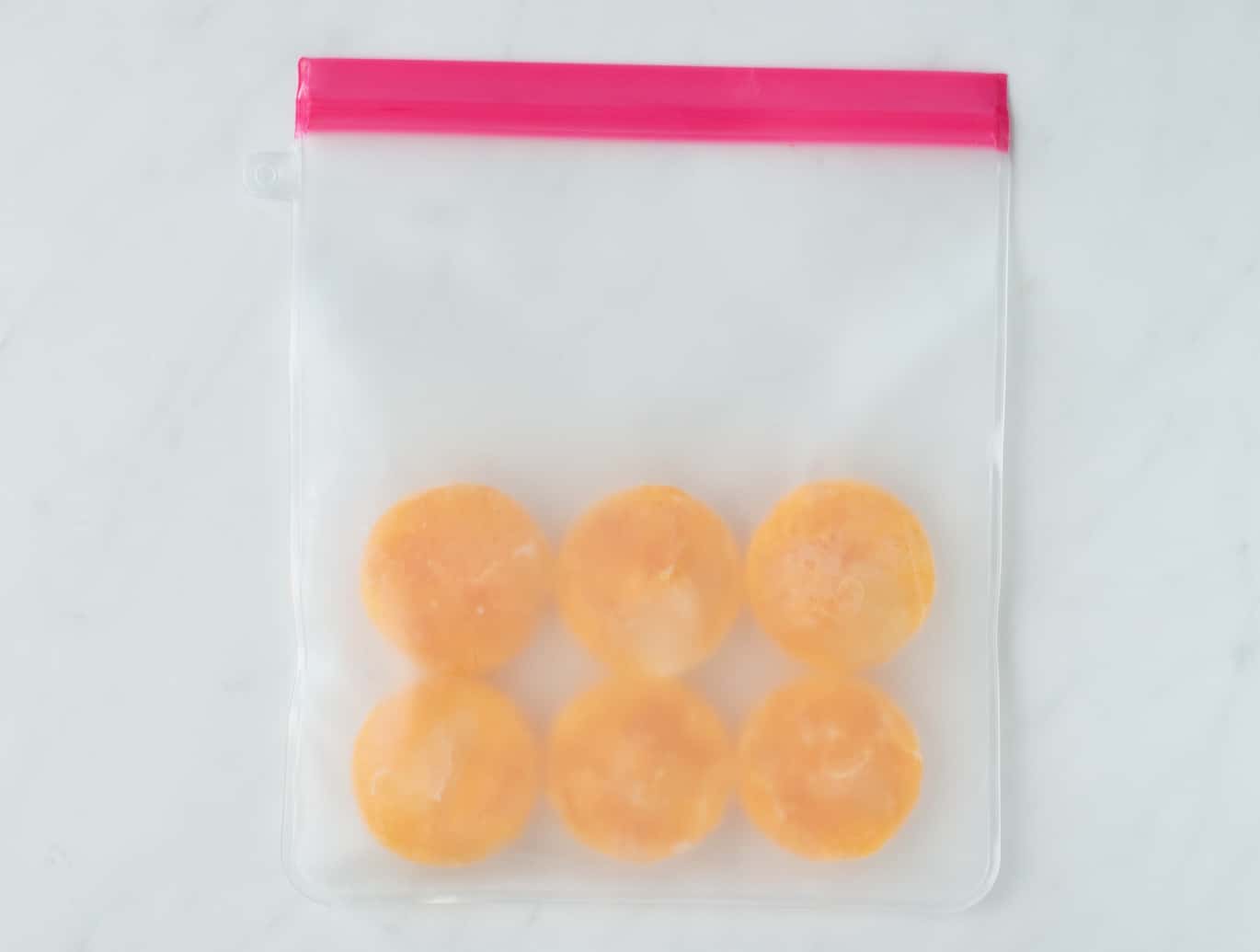
How to Freeze Hard Boiled Egg Yolks
If you want to use the egg whites for another recipe and then cook & freeze the yolks to use on tops of salads or other toppings, you can simply separate the whites from the yokes and cook just the yokes.
- Carefully place the yolks in a single layer in a saucepan and add enough water to come to at least 1 inch above the yolks.
- Cover and bring the water just to boiling.
- Remove the pan from the heat and let the yolks stand, covered, in the hot water for about 12 minutes.
- Remove the yolks with a slotted spoon, drain them well and package them for freezing.
Can You Freeze Scrambled Eggs?
Yes, you can freeze scrambled eggs! You can freeze scrambled eggs raw, or cooked, using different simple methods below. This is GREAT for meal-prep breakfasts!
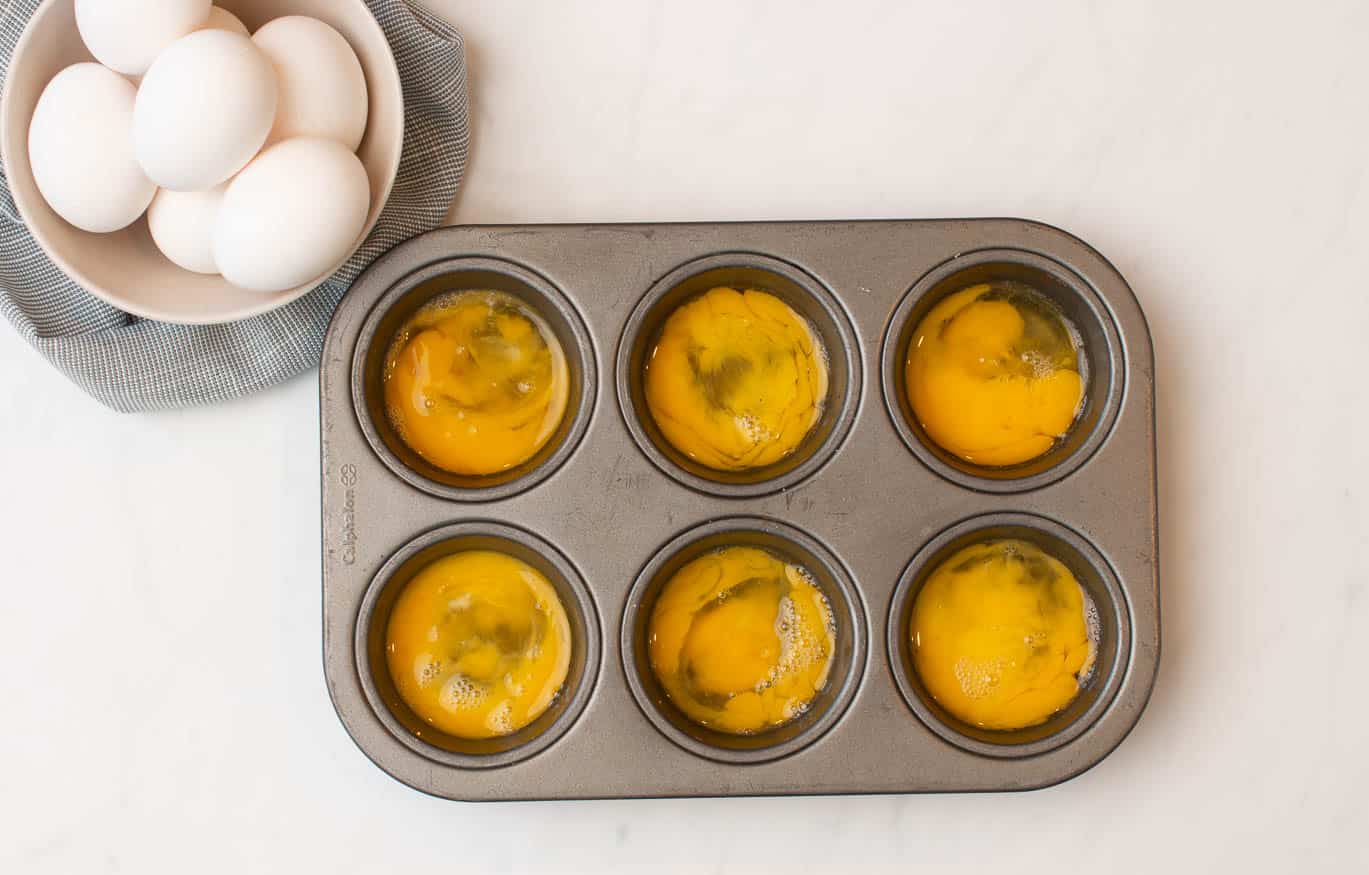
How to Freeze Raw Scrambled Eggs
- Scramble raw eggs in a bowl.
- Add one teaspoon of salt for each cup of raw eggs.
- Transfer the eggs to a muffin tin or ice cube tray and cover to freeze.
- Remove them from the containers the eggs were frozen in, and transfer them to a labeled freezer bag to store in the freezer.
- Thaw and cook as usual within one year of freezing.
How to Freeze Cooked Scrambled Eggs
- Let the cooked scrambled eggs cool completely.
- Wrap tightly with plastic wrap, pressing down gently to remove any air.
- Cover with foil, or store in freezer bags.
- Label them and place in the freezer.
- Thaw and reheat within one year of freezing.
Can You Freeze an Egg in the Shell?
No! According to the USDA, if an egg cracks while it freezes, it needs to be thrown away. Alternatively, if it doesn’t crack while freezing, the egg white and yolk don’t blend well together after being frozen this way, making the uses limited.
That being said, egg freezing in the shell can end up costing you money, instead of saving it, and could waste eggs that very well may have been saved and stored if frozen in another method. We want to save money, not waste it!
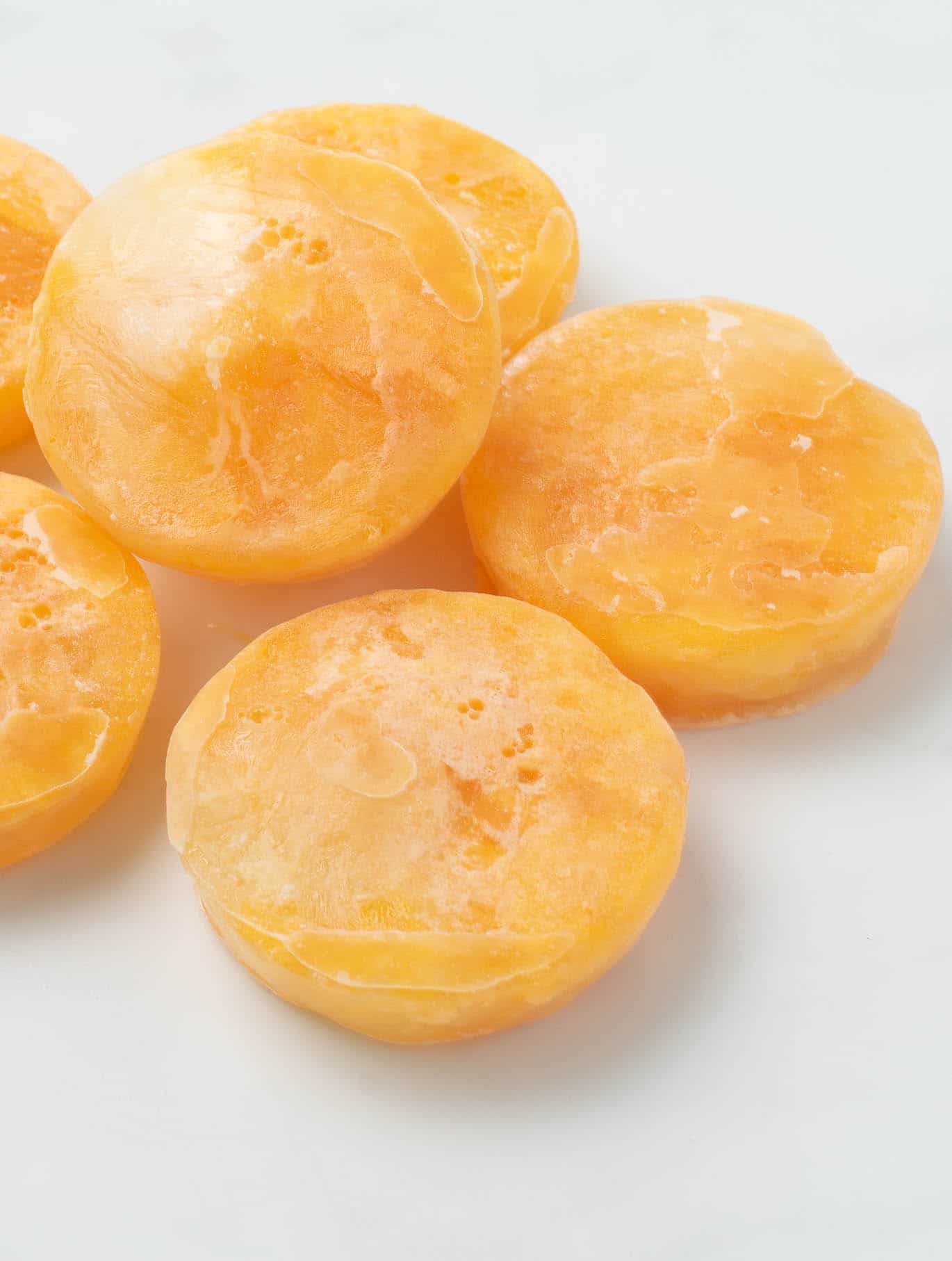
Tips and Tricks for Egg Freezing
Always freeze eggs in the amount that you will use at one time. Believe me me, it doesn’t work to try to chisel off part of a frozen egg block!
Use ice cube trays or muffin tins to portion the eggs out correctly. I use this conversion guide.
1-1/2 tablespoons yolks = 1 egg yolk
2 tablespoons whites = 1 egg white
3 tablespoons eggs = 1 whole egg
If you have trouble removing the frozen eggs from the muffin tins or ice cube trays, simply sit the bottom of the trays in warm water for a few seconds, and they should slip right out. Plastic ice cube trays work best for this method.
If you are freezing multiple eggs in a jar or container, make sure you leave 1/2 inch head-space for expansion before freezing.
Clearly mark your freezer bags with the date one year from freezing to make sure you use your frozen eggs within the safety window.
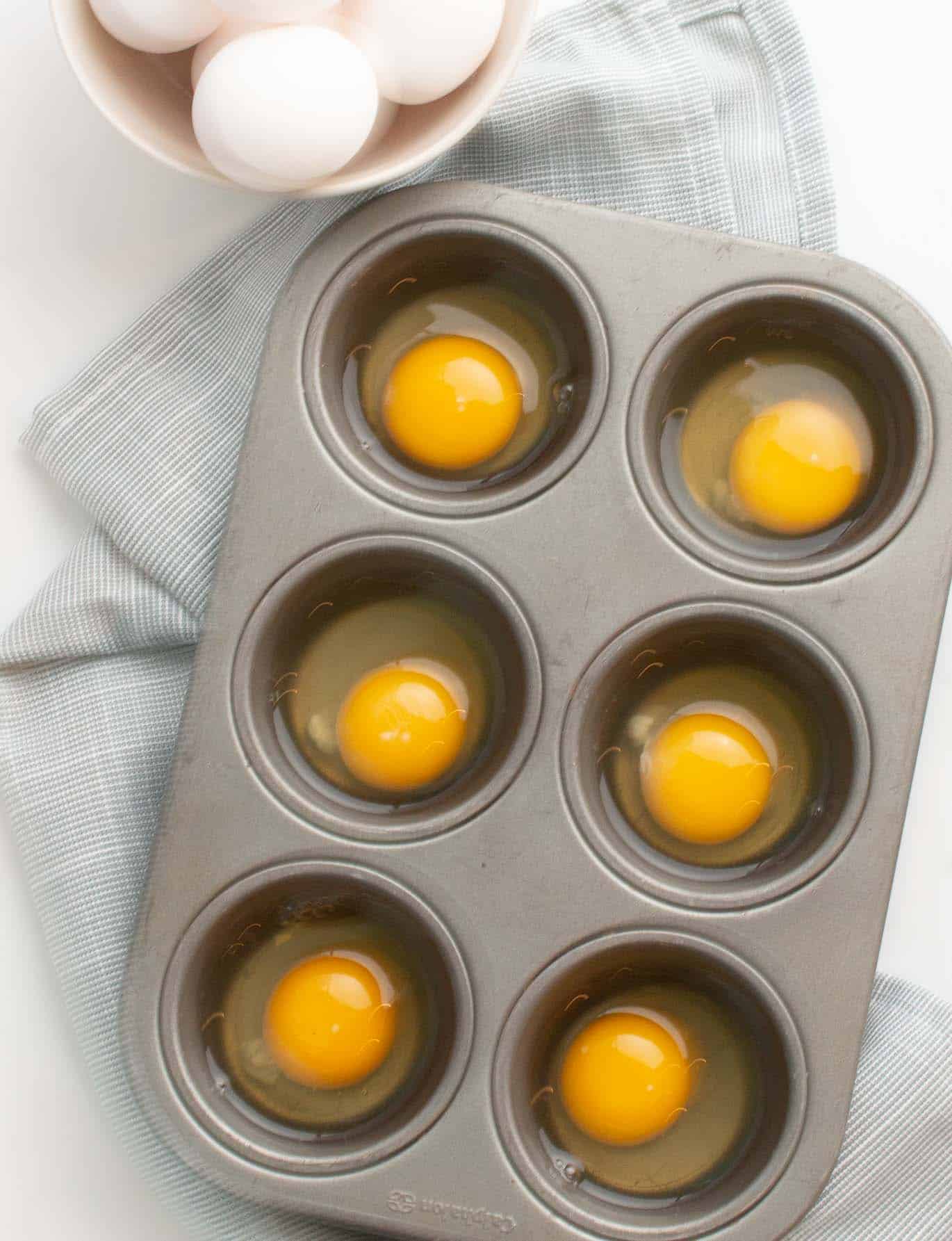
Want Some Recipes You Can Use Frozen Eggs In?
- Basic Muffin Recipe – use this recipe, or any of the variations, to use your frozen eggs!
- Make Ahead Freezer French Toast Sticks – a freezer-friendly breakfast recipe!
- French Toast Casserole – a great way to use up lots of eggs.
- Vintage Banana Cake – this recipe is vintage, from my Great-Grandmothers old recipe box.
- German Pancakes (aka Dutch Babies) – this uses several eggs so it’s perfect when you need to use up lots of eggs.
So, can you freeze eggs? Yes! Now that you know how to freeze eggs, and just how simple it is, you most certainly should!
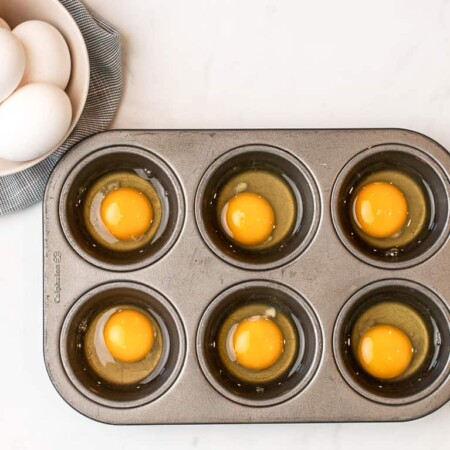
How to Freeze Eggs
Ingredients
- 12 eggs
- 1 tsp salt or sugar
Instructions
- Lightly scramble the eggs. Stir with a fork until the yolk and whites are blended together without incorporating air.
- Add salt or sugar to your eggs – don’t skip this part!! Egg yolks have a gelatinous property in them that will thicken when frozen. By adding in salt or sugar before freezing, it will stop it from happening.
- Add in 1 teaspoon of salt per cup of eggs for eggs that will be used for savory items like scrambled eggs, omelets or souffles.
- Add in 1 teaspoon of sugar per cup of eggs for eggs that will be used for cake, desserts or sweet items.
- If you are freezing individual eggs, use 1/8 teaspoon of salt or sugar for each egg.
- Store your eggs. Cover and freeze in a muffin tin or ice cube tray until frozen (about 4-6 hours), and then transfer them to freezer containers or freezer-safe bags.
- Label your eggs. Add the date, the quantity and make a note on your storage container if you used salt or sugar in the eggs. Make sure you adjust the recipe to compensate for the sugar or salt that you used in your eggs. Your eggs are now good for up to a year.
Notes
Nutrition
Loved this recipe?
Make sure to follow on Instagram @happymoneysaver and on Pinterest @happymoneysaver for more money savin’ recipes!
This post is full of so much information on how to freeze eggs. I’d suggest you PIN IT now so you can save it for later too!
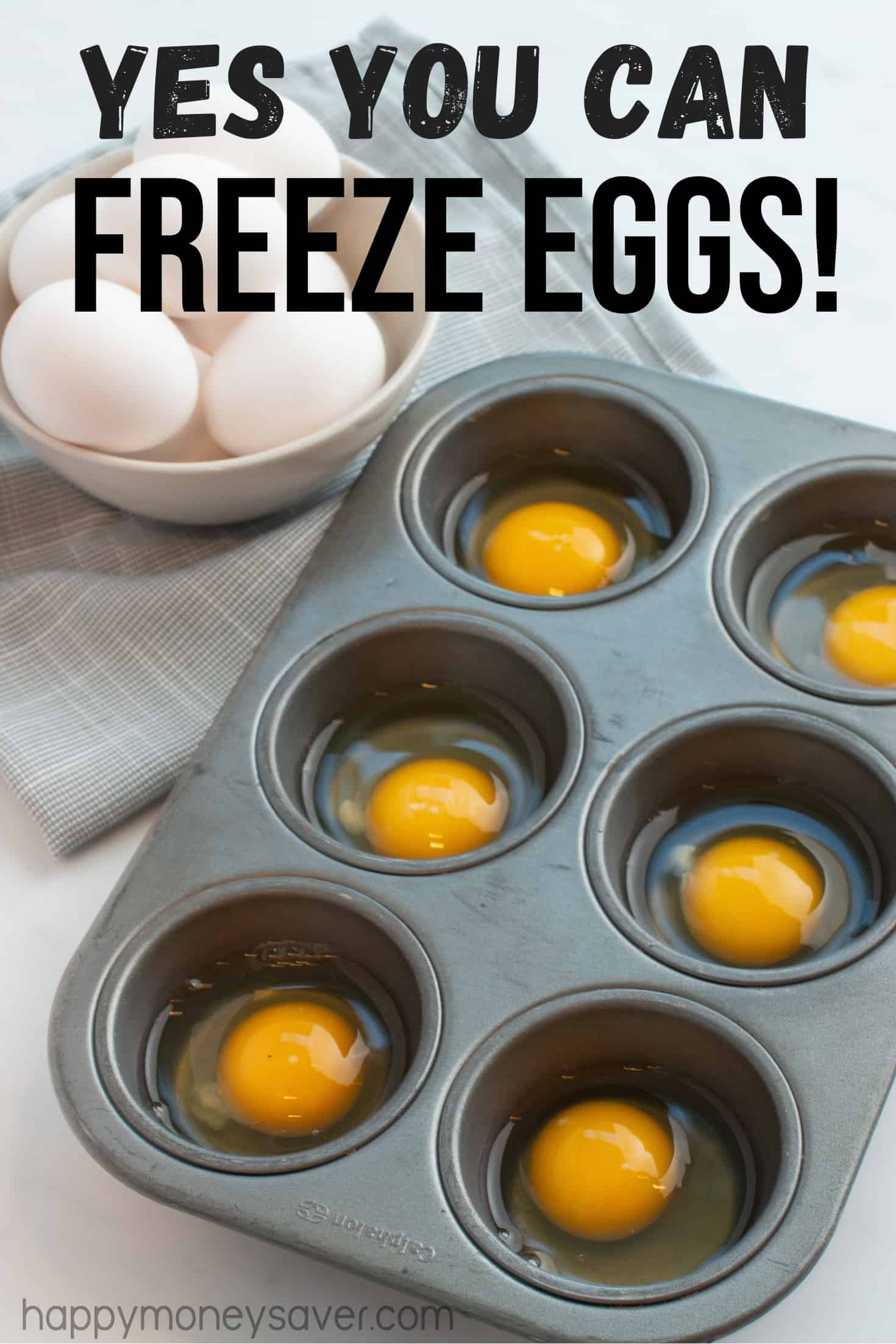
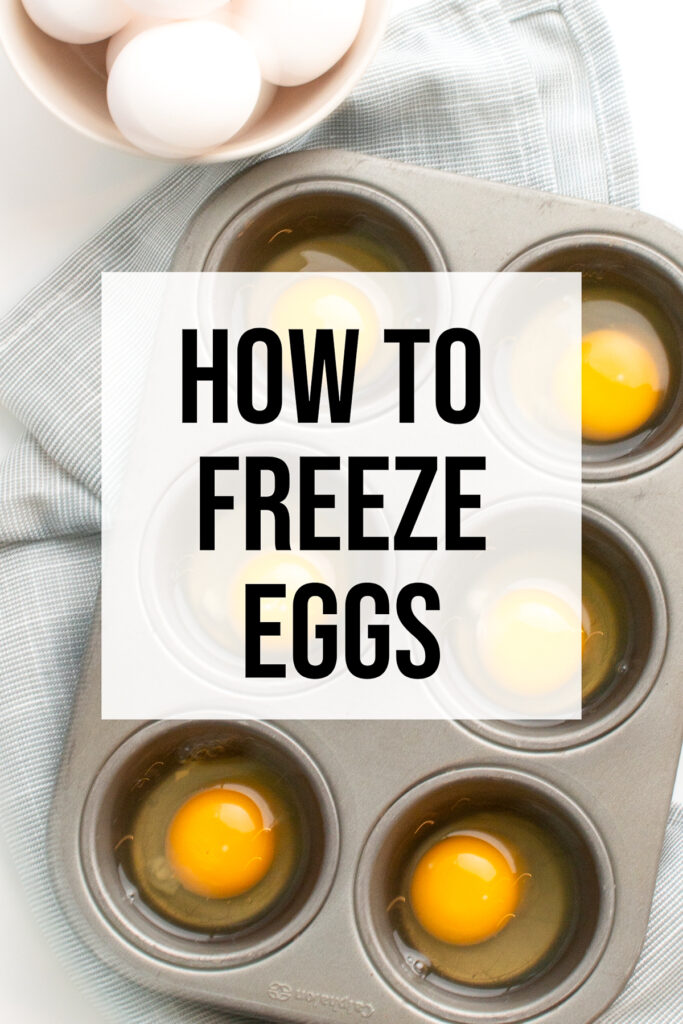
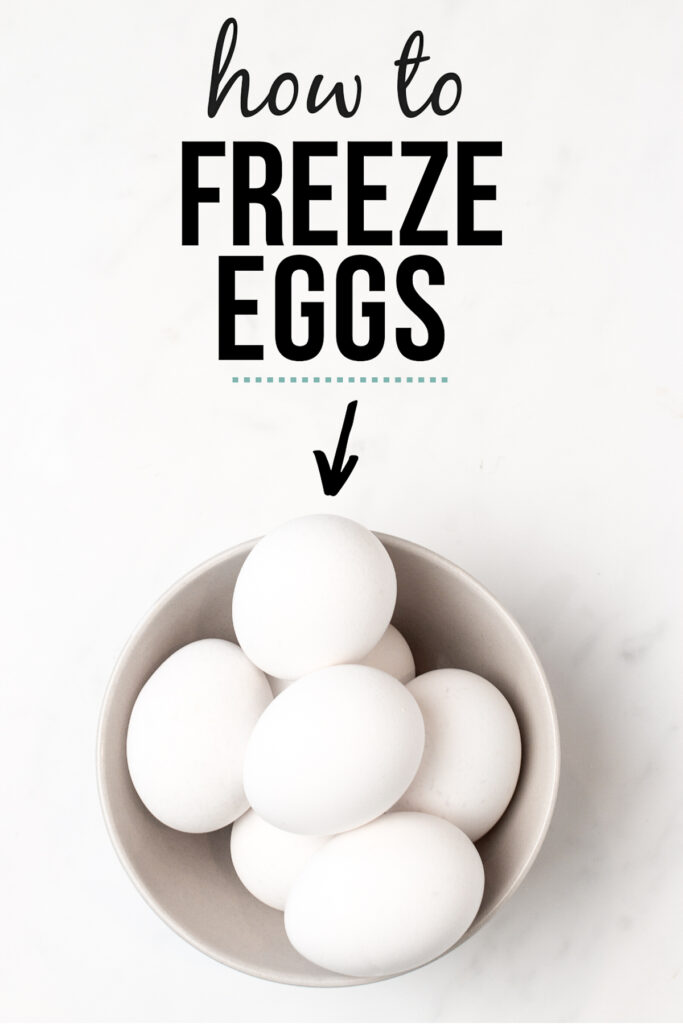
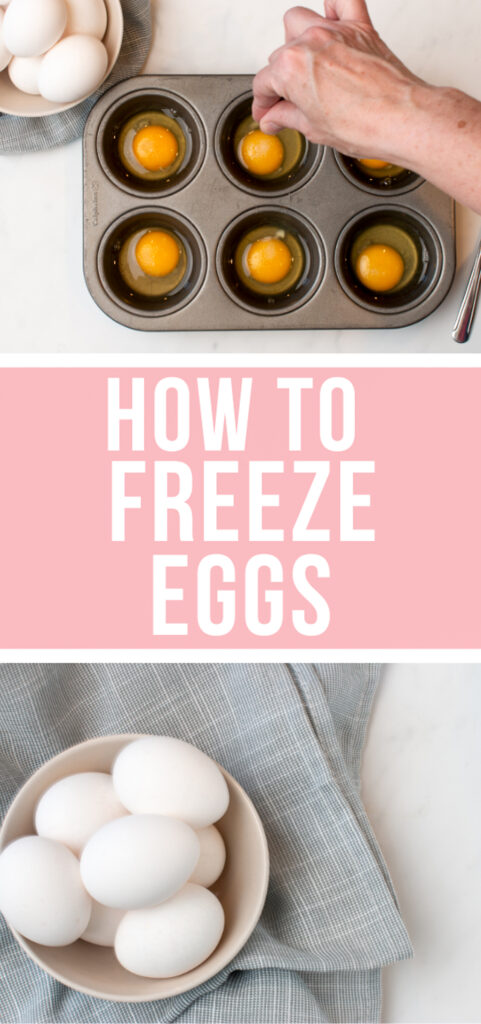




Comments & Reviews
Cathy Engen says
I grew up on a farm. We never froze our eggs in the shell. We always did the ice cube tray trick, froze them, and then separate them and put them in a bigger ziplock bag, then put that bag in another freezer bag – so it was double bagged. We would pull put however many we needed for a meal or recipe the night before. We did not beat them up, or add salt or sugar- just the pure egg.
Dolores Novak says
I was wondering, if you want fried eggs could you use the ones that you froze??
And do they taste the same ?
`RomaLInda says
I have simplified method without any containers.
All you need is the super mini tinny Ziploc bags the ones for snacks about one and a half inches wide and about five long like you use for kids to give them a handful of nuts.
You just separate each egg and dump each egg yolk in one and each egg white in one,
then put them in the freezer laying flat and once freeze in couple hours or so
then just put them in the Mama ziplock bag and they are happily together, this way you have your individual egg white and egg yolk, frozen quickly and easy to defrost because they are so flat. Also
Dawn Narmore says
Once you thaw the egg can it be used for fried eggs?
Ruth says
Once the eggs are thawed the yolks are solid, almost as if they had been hard boiled. What can they be used for? They’re too hard to put in a cake batter, quiche or make French toast.
Pamela says
This is according to theincredibleegg.com—Yolks
The gelation property of egg yolk causes it to thicken or gel when frozen, so you need to give yolks special treatment. If you freeze them as they are, egg yolks will eventually become so gelatinous that they will be almost impossible to use in a recipe. To help retard this gelation, beat in either 1/8 teaspoon salt or 1 1/2 teaspoons sugar or corn syrup per 1/4 cup of egg yolks (about 4 yolks). Label the container with the number of yolks, the date, and whether you’ve added salt (for main dishes) or sweetener (for baking or desserts). Freeze.
Tanya Toki says
Milk heated and simmered a minute or so then put in a glass jar covered and refrigerated will last for months.
Tonya says
Can they still be hard boiled?
Karrie says
No, you can’t freeze hard boiled eggs, they don’t come out well after being frozen unfortunately.
Jo says
Mother Earth mag did a study about 40 years ago that showed that UNWASHED eggs can be left on the counter for over a month with out going bad. Eggs you get at the grocery have been washed and must be kept cold.
Kathleen Bodden says
Hi this isn’t about eggs but freezing milk or cream. If you don’t use that much and don’t want to freeze milk (even a small container goes bad on me until I discovered this trick), immediately after opening put a small pinch of salt into the container, recap itand shake gently. Doesn’t affect the taste and it will last weeks longer, of course always keep refrigerated.
Glad I stumbled onto this blog, lots of great ideas here!
Sharon Kellogg says
Being a Navy wife and shopping at the Navy Commecery once a month, I have frozen my milk for over 20 years. I just buy plastic half gallons and put them in the freezer, as is. I do nothing extra to them. I do however empty them into a half gallon when thawed, that way there is no need to stir or shake. Now that I am old and don’t drive I use Walmart’s order on line and my daughter picks up all of my monthly groceries,, that I have chosen myself, once a month. on her way home from work. This way it does not put her out any and I get just what I want. It’s the only way to shop.
Christine says
I’ve never frozen milk before but now I’m curious! Do you normally need to shake or stir milk that has been frozen and thawed?
Iris Griffin says
Question why take eggs frozen eggs out container and put into freezer bag?? Why not leave in the container in freezer use like ice when you need 2 or 3 eggs
Ariana says
It will last longer if you put them into a concealed bag.. the ice cube tray just helps them to stay altogether and intact while they freeze..
Jon says
a plain ‘ice-cube’ tray has no cover, and modern refrigerators/freezers do have technology to prevent frost … so, I imagine that long time storage of uncovered eggs would result in damaged eggs … Zip-type bags do seal !
Shareen Dailey says
Where can I find those plastic egg crates?
Karrie says
I think I found it at Walmart. 🙂
Sharon says
Camping section.
Cassy says
Ive frozen beaten eggs before, but always with salt or sugar. This makes it tough sometimes when i don’t want added salt or sugar in my dish. I see that you are freezing right out of the shell. Everything else I’ve come across says to do it with beaten eggs adding either salt or sugar.
I believe I read all the comments and didn’t see an answer to my specific question. If I missed it, I’m sorry to bother you.
Also, I’m so glad I’ve found your site. Can’t wait to explore it further. Thanks so much.
Melinda says
And here’s one also you might not know you cane freeze milk when it’s close to the expiration
Sandi says
Can you share how you freeze the milk please?…like what type of container do you use or do you leave it in the jug or carton it was bought in?…thank you for the tip…we often get free gallons of milk offered to us but have said no cuz we can’t drink it fast enough…this might help us to say yes!…
Diane C. says
@Sandi My mother can no longer go to the store herself so I do it for her and I get her several half gallon jugs of milk which she puts in her deep freezer unopened. She thaws it in the refrigerator or sits it in the sink then shakes it well before opening. The jug does expand and looks like it will explode but she has never had a problem with it.
Nancy says
I put a fold top plastic sandwich bag into my muffin tin, and measure in a little less than 1/2 c. of milk, buttermilk, etc. into each bag. Then freeze in the tin. When frozen I close each bag around its disc of milk and store all in one large freezer ziplock with the type of milk frozen and the date. Then pull out what I need and set the baggie into a small bowl, coffee mug, etc. to thaw and just pour it from the baggie.
Jackie says
I freeze milk in its container, just take about a half cup out first.
Beverly Hilliard says
Of course freeze milk…just leave 1 inch at the top before putting in the freezer
Andrea says
Hi I have been freezing eggs as you described above and have started using them but I am finding that the yolks are quite firm even after defrosting at room temperature. When beaten they go into lumps. What is causing this please as they are only suitable for scrambling etc
Edward Carver, 5th generation Floridian. says
Hi Lady:
I am an older person who has raised chickens for over 50 years and had never heard of freezing eggs but will try it. Probably mostly because there was NO freezers in my early days. I have a good question, Which way to freeze them, Quick? or slower like a home freezer? Seems to me that a quick frozen egg would keep it’s shape in the shell without cracking, and seems as if the slower way could lead to cracked eggs. Have you tried each way? or does your freezer do a quick job? It is my idea that Most home freezers are opened more often than commercial freezers and that may cause the eggs to crack. I live alone and do not open the “HOME” freezer daily so will try it both ways. Will let you know what I find out. I am so glad My Daughter read your page and sent it to me. Tis nice to know even a city FARM GIRL has such good knowledge of farming chickens.
chris says
I am an australian and our weather is extremly hot in summer, my question is if i freeze my eggs then defrost them would the heat while defrosting the eggs would it still be ok to defrost them on a bench befor baking with them or would the heat damage them somehow if i was unable to use them as soon as they defrost.Thank you for this helpful tip i had no idea that you could freeze them, that would also free up some room in my fridge with bulky cartons.
Karrie says
Its best to thaw them and keep them cool – like in the refrigerator or running under the sink in cool water. If you are planning on cooking them that day you could defrost in microwave a bit but you may get some cooked bits. Better safe than sorry.
Cassandra says
Hi there! A local farmer is running a special on her pastured hen and duck eggs, so I was thrilled to find this! Another commenter shared this link: http://www.incredibleegg.org/eggcyclopedia/f/freezing-eggs/
It addresses freezing whites and yolks separately, or all together but beaten, and says that yolks frozen by themselves can become extremely gelatinous over time. They never mention freezing the white and yolk together but unbeaten, so I’m concerned that might also result in a change in texture. Have you noticed a gelatinous texture in the yolks after freezing whole and thawing?
Karrie says
I haven’t noticed any change in texture, anyone else have this issue?
Pam Wolfe says
Are there any instructions on thawing them?
Karrie says
You can run cool water over the bag, or thaw the bag overnight in the fridge.
Gayle Graham says
Hi Karrie…..it’s me bugging you again about my above message of Jan. 25.
Sure would like to know about bacteria because I get cartons of
eggs given to me and would love to be able to freeze them whole and
in their cardboard carton…..Thanks again……
Kathy says
how long does it take to thaw?
Gayle Graham says
Sorry….Kathy……I didn’t pay any attention. I had put the one egg in a small
container just big enough to hold the egg…..then I took it out of the freezer and
put it on the counter for awhile and then in the fridge still in the small container.
I had noticed the crack (very thin crack) down one side of the egg when I took
it out of the freezer. I haven’t received an answer back yet from Karrie regarding
bacteria…She had said above on Jan. 26 that she say has seen eggs crack and
expand (mine didn’t expand) and she still says no to freezing but she hasn’t
answered the reason she says no……I’ve asked if it’s because of bacteria which
someone had mentioned but she hasn’t answered so far.
Kes says
Ok. I just have to say something here. Its like, you know, common sense? Just like with fresh eggs. .. do not use cracked eggs. Obviously they could become contaminated with bacteria. Eat your cracked eggs at your own risk 🙂 Bloggers cannot “guarantee” eggs will or won’t harbor bacteria… come on, geez
Gayle Graham says
Hi Karrie…again….you had said not to freeze raw eggs in the shell because
if they crack it could cause bacteria to enter the egg….or was it someone
else who said that about bacteria ?….in any case I tried freezing one egg as a test and
there is a crack down on side of the egg. I would like you to tell me
for a fact, that this egg, when thawed, will have bacteria in it and should
be thrown out. Thanks again….Gayle
Cassandra says
I’m sure Karrie can’t guarantee that there will or won’t be bacteria in it, but with a crack in it, you do run that risk. I would personally still use it and make sure it’s thoroughly cooked, but it’s probably worth the small amount of extra work to crack future eggs before freezing. Salmonella poisoning is a big fat bummer.
Deshi says
Most Bacteria will not multiple under Frozen temperatures. It’s unlikely they can contaminate the egg while it is Frozen in the freezer, but it can happen if you take it out and defrost it, or if say a power outage happens and it gets warm enough in the freezer for microbial activity to pick up again.